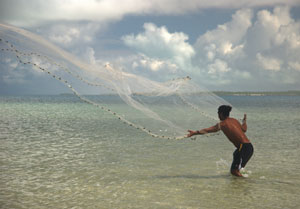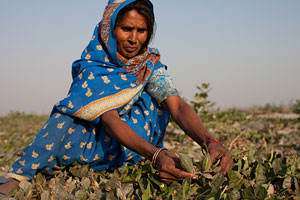This year, the United Nations Environmental Programme (UNEP) and its partners are asking people to think about the amount of food they waste on World Environment Day with the slogan: Think. Eat. Save [external website].
An incredible 1.3 billion tonnes of food is wasted in kitchens, supermarkets and restaurants around the world each year–equal to the amount of food produced in sub-Saharan Africa annually.
World Environment Day 2013 provides an opportunity to reflect upon the challenges facing us all, particularly the world's poor, in maintaining natural resources while also producing enough for everyone to eat. Of course, waste is just part of the difficulty in achieving food security. Increasingly scarce resources due to both climate change and population growth also pose significant challenges.
By 2030 it is believed up to 75 per cent of Pacific Island coastal fisheries may no longer be able to meet the food security needs of local communities. In South Asia, more than 750 million of the world's poorest people rely on an increasingly erratic cycle of monsoons and ice melt from the Himalayas to grow their crops. Poor people, particularly women, are most vulnerable to the resulting floods, drought, water shortages and pollution, and crops are often washed away with little warning.
In 2013–2014, AusAID will spend an estimated $411 million on programs designed to increase food security in by improving agricultural productivity and rural livelihoods and building community resilience across the Pacific, South Asia and Africa.
- Australia has committed $25 million towards the Pacific Oceanscape Framework over the next four years, which includes significant support for the important work of the major Pacific regional fisheries agencies.
- AusAID is also working in the Pacific with the Australian Centre for International Agricultural Research (ACIAR) to help communities better manage their valuable fishing stocks.
- In Africa, AusAID is supporting ACIAR's research into the development of a vaccine against the Southern Africa New Castle disease, which kills 50 to 100 per cent of chickens where outbreaks occur.
- An Australian-supported program, SIMLESA, led by the International Maize and Wheat Improvement Centre, is supporting farmers in Ethiopia, Kenya, Malawi, Mozambique and Tanzania to improve their maize and legume crop production.
- Australia is partnering with the World Bank, the UK and Norway in the South Asia Water Initiative to improve management of the Ganges, Indus and Brahmaputra Rivers. Key technology that was developed in Australia to manage the waters of the Murray Darling Basin is now being transferred by the CSIRO to South Asia to improve information about water flows through the region and enable better management of this natural resource.
- In a partnership with the International Centre for Integrated Mountain Development (ICIMOD) in Nepal, Australia is also helping to support ecosystems and protected areas of the Koshi River basin, which is prone to erosion and other natural hazards, covers some of the poorest parts of China, India and Nepal.
- In Sri Lanka, Australia is helping rural communities to develop sustainable livelihoods and stop deforestation. A four-year program with the United Nations Development Programme and the Sri Lankan Government's Department of Forestry is establishing Community Forest Groups to improve incomes and create employment opportunities to reduce forest scavenging.


